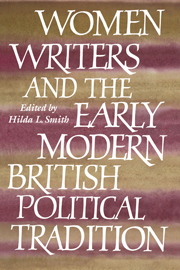Book contents
- Frontmatter
- Contents
- List of contributors
- Preface
- Introduction: Women, intellect, and politics: their intersection in seventeenth-century England
- Part I Women's political writings, 1400–1690
- Part II Women's political and philosophical writings, 1690–1800
- Part III The intellectual context and economic setting for early modern women
- Part IV Early modern legal and political prescriptions for women
- Conclusion: women's writing, women's standing: theory and politics in the early modern period
- Index
Introduction: Women, intellect, and politics: their intersection in seventeenth-century England
Published online by Cambridge University Press: 04 August 2010
- Frontmatter
- Contents
- List of contributors
- Preface
- Introduction: Women, intellect, and politics: their intersection in seventeenth-century England
- Part I Women's political writings, 1400–1690
- Part II Women's political and philosophical writings, 1690–1800
- Part III The intellectual context and economic setting for early modern women
- Part IV Early modern legal and political prescriptions for women
- Conclusion: women's writing, women's standing: theory and politics in the early modern period
- Index
Summary
Relating women's intellectual history to British political thought in the early modern era leaves one in a perpetual state of schizophrenia. With rare exceptions, scholars working in these distinct areas do not pursue the same primary texts, or trust the judgments of the same set of contemporary scholars. Women's intellectual contribution to the era has been studied mostly through biography, or through a focus on individual authors, with a very few – Aphra Behn; Mary Astell; Margaret Cavendish, duchess of Newcastle; and Margaret Fell Fox – garnering the overwhelming attention. Otherwise, women have fallen within categories formed by broader alliances: sectarian women, Leveller women, sympathizers for royalist or revolutionary causes. Or, they have been tied to their genres, as writers of meditations, poets, tractarians, playwrights, and authors of domestic advice.
There has been, and perhaps this is wise, little attempt to characterize women's writings generally, and virtually no attempt to do so for those of non-fiction authors whose primary interest was politics. In contemplating disparate approaches to seventeenth-century women's political writings, a number of questions arise in this volume based on traditional assumptions concerning women and politics. How can women write about what they cannot do? or about what is considered outside, and, by some, antithetical to their nature? or about which they have been kept essentially ignorant? All of these realities covertly and overtly confronted women when they wrote about political topics in the early modern period.
- Type
- Chapter
- Information
- Publisher: Cambridge University PressPrint publication year: 1998

